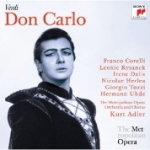Please don’t start rejoicing too quickly. On paper this is a fascinating cast, particularly given the performance date: March 7, 1964; but not everything works out the way we want it to.
Of course, Don Carlo is an odd role; it doesn’t capture the listener’s imagination the way Philip or Posa do. Carlo is an idealist, a loser in love through no fault of his own and not a true hero. Furthermore, he has only one aria, early in the opera (this performance is, of course, the four-act Italian version), and Eboli’s arias outdo him in showiness, Elisabetta’s in heartbreak, Posa’s in dignity and gravity (and beauty), and Philip’s in monumentalism.
In the ’60s and early ’70s the Met was spilling over with terrific tenors, but Franco Corelli drove audiences wild in a whole different way, his scooping and mumbling as fascinating as his high notes were staggering: I’ve still never heard a tenor who had such a visceral effect. Vickers’ voice was huge, but Corelli’s was tempered steel–it gleamed. The point is, he needed true melodrama to shine (Cavaradossi, Chenier) and Carlo is only a partial fit.
That having been a prologue, vocally, Corelli is in terrific form here and his admirers will not be upset. He bullies his way through his opening aria; his Oath Duet with Posa is a singing contest, with Corelli tossing in a high-C where it not only doesn’t belong but doesn’t actually fit; he’s passionate and involved in his confrontation with Elisabetta in the courtyard and ends it on a blazing B-flat, albeit with the words “Maladetta son”, the “io” apparently an irritating syllable.
Grievously, he does not sing his part in the Auto-da fé scene–he may have missed his physical entrance and been off-stage–so when Elisabetta sings “Qui Carlo!” he is in fact not “qui”. There’s a brief pause and then the orchestra picks up where Carlo should be singing–but no tenor. He shows up to yell at Philip and have his sword taken away, but it’s a pretty bizarre event. The final duet with Elisabetta is handsomely done. And so, note-by-note, Corelli impresses as he tends to, and there are high points, but this is not a portrait of Don Carlo. To be blunt about it, Carlo is a text-driven role and Corelli was a broad-emotion-driven singer.
Having rambled on about Corelli, I must give the others short shrift. The great Leonie Rysanek never was quite the Verdi soprano the Met wanted her to be (they gave her Aida, Amelia in Ballo, Lady Macbeth, and Abigaille) and she is particularly wrong for the sad queen in this opera, which she sang six times at the Met. Too much of the role sits in the fog-bound middle of her voice, where pitch failed her and she had little effect. Of course, she imbues every word with meaning, but still, you’ll wince at how sharp she sings near the end of her Garden Scene farewell to her companion–and elsewhere, she simply sounds miscast. Her final aria reaches some splendid heights, but it’s just too little, too late. As her rival for the King, Irene Dalis is better than anyone might have thought: her sound is hardly Italianate but she has Eboli well in hand–high, low, seductive, vindictive.
Nicolae Herlea, who sang only briefly at the Met, makes an unsubtle Posa. All the notes are here–and very loud, indeed–but this is the least introspective reading of the role I’ve ever heard: a Posa with no inner life and no inherent dignity. I never was a great Giorgio Tozzi fan, and his Philip here makes me recall why: the tone is woolly, he doesn’t always sing on key, and there is no true regal bearing; with Tozzi, anger equals louder and sadness equals a sort of sob. Hermann Uhde’s Grand Inquisitor sounds old but not threatening. Kurt Adler’s conducting is almost unimportant, but the Met Orchestra and Chorus are good enough.
If you need Corelli as Don Carlo, there is a better performance on Opera d’Oro from 1970; if you need a great performance of the opera (in Italian), the EMI under Giulini, Decca under Solti, or EMI under Karajan are tied for first.
































